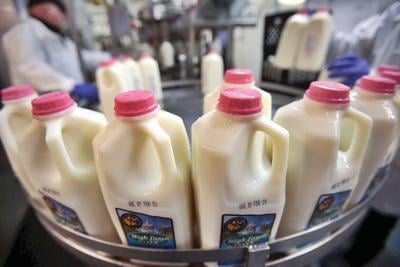Our society is so food-obsessed, there's a psychological diagnosis for the condition: orthorexia — an obsession with eating foods that one considers healthy and avoiding foods they believe are harmful.
While the aspiring orthorexics are obsessing over whether to eat mung beans with goat cheese or quinoa with arugula for dinner, there's a large swath of our Berkshire population that faces a very different question. Nearly a fifth of our citizens, many of them children, don't know where they will get their next meal. And many of our commercial dairy farmers, the people who produce most of the food in the state, are on the verge of bankruptcy.
National Ag Day is a good time to shift our attention away from what we are eating and toward the farmers who grow the food and to the farmland where it's grown.
Currently, New England produces about 10 percent of its own food on two million acres of farmland. The goal is to increase that to 50 percent as the current agricultural regions of the country become dryer, hotter and more vulnerable to the ravages of the changing climate. The "New England Food Vision" believes we can do that by bringing 4 million more acres into production. Expanding our farm sector to achieve greater regional self-reliance will require more farmland, more farmers and more farm advocates. With a growing population, continued loss of land to development, and rising seas that will force people in Boston and along the coast to migrate inland, the development pressure on farmland will be even more intense. Without stronger farm policies, more farms will be lost and Massachusetts will become even more reliant on food from other regions than we are today.
All this seems bleak, but it is within our power to secure our farmland for the future. To do that, we have to protect our remaining farms. We are more self sufficient for dairy than for any other food product in New England, producing half of the milk we consume here. Let's start by saving our dairyland. Most of New England's farmland is managed by dairy farmers. Eleven percent of Massachusetts' farmland lies in Berkshire County and the majority of this land — over 7,000 acres — is managed by our 19 remaining dairy farms. So, you can say these dairy farmers hold the key to our food security. And that would be fine, because most of these farms have been around for generations and the families are committed to farming. But their commitment can withstand only so much financial loss and personal hardship. They are under a strain right now that rivals the hardship of the Great Depression, according to dairy expert Nate Wilson.
Dairy farms are facing a perfect storm this year that is demoralizing even the most stalwart: When your milk check comes with a Suicide Hotline flyer tucked in the envelope, you know your industry is at rock bottom. A multitude of demons are tormenting farmers right now: 2018 is the fourth year of record-low milk prices (they are currently as low as they were in the 1970s), milk consumption is declining (in large part due to competition from what farmers call "nut juice"), plus there's a vocal and almost militant vegan movement that seems bent on turning public opinion against dairy products and farmers, citing false nutritional facts and misinformed over-generalizations of animal abuse and unclean milk. The vegan movement doesn't seem to care that milk is the most affordable and accessible source of complete protein and calcium for children. (Almond milk, in contrast, uses huge amounts of water in water-scarce California, is shipped 2,000 miles to get here, and has less protein than cow milk.)
To make up for lost income, farmers tend to produce more milk, which sadly only leads to excess supply and lower prices. The industry has resisted implementing supply control measures, which have helped Canadian dairy farms. Some dairy coops are even dropping their farmers this year, leaving them high and dry with no outlet for their milk, with closure as their only option. Huge national dairy conglomerates — Big Milk — would perhaps like nothing more than to put New England's small family dairy farmers out of business so they can continue to vertically integrate the industry and control the milk supply and price. Our Massachusetts family farmers are caught between culture wars and global economics, but we can help them survive, and even thrive. Our food security relies on them.
Luckily, we haven't lost any Berkshire dairy farms this year, but Western Massachusetts lost one last month, bringing the statewide decline down to 117. Milk is New England's (and Berkshire County's) biggest food product. Milk's a sustainable food that has the lowest carbon footprint of all proteins, slightly less than tofu, (which is decidedly not local). New England milk is more eco-friendly than milk from the megadairies of the west and southwest, because grass grows here with rainwater (unlike the dryland farms of the west). Berkshire County's soil and topography are especially well-suited to grass and grazing animals. Berkshire milk from our wholesale producers is bottled (or made into butter, yogurt, ice cream, whey protein powder etc.) in one of the three plants in Massachusetts: Agri Mark Cabot in West Springfield, Garelick in Lynn, or HP Hood in Agawam and you can buy it in any supermarket.
Buying milk helps farms stay in business and secures our food security. Drinking milk is a political act!
A call to action
Here is a guide to some of the things you can do to help support Berkshire dairy farms:
Buy Local Dairy Products: Of our 19 dairy farms in the county, 14 produce for the wholesale market and you can buy their products as Cabot butter and cheese, Hood milk and ice cream, Organic Valley, Garelick, and store brand milk: all are made with milk from Berkshire farms. Most of our farmers are members of the Agri Mark Cabot Dairy Coop or Dairy Farmers of America, and there are a few independent bottlers too, and three smaller dairies in the county that produce raw milk and cheese and other products for sale on the farm and locally. The upshot: Almost all the milk in the store is from our region. Cabot and Hood are New England brands.
Where was your milk bottled? Almost all the milk for sale in Massachusetts is produced in Massachusetts, eastern New York, Vermont or New Hampshire. Learn where your milk was bottled by typing in the milk code from your carton: www.whereismymilkfrom.com/dairy/local
In Your Community: Support dairy farms in your town by passing right-to-farm laws, creating agricultural commissions, and asking your dairy farmers what help they need to stay in business. Support local land trusts that help working farms through purchase of development rights and succession planning. Support farms that are trying to get into the Agricultural Preservation Restriction Program. Help dairy farmers stay on the lands they lease: There is a shortage of land to grow the hay and corn needed for feed. If you have extra acres, offer it to a farmer! Local boards and commissions can show support for their farms by enacting farm-friendly bylaws and highlighting farms' contributions to the local economy (a typical 100-cow dairy spends about 1 million dollars a year in the local economy). And of course, give a friendly wave, not a hostile honk, to the manure spreader driving slowly down the road.
Political Action: Two important bills that will help Massachusetts' dairy farms are currently before the State legislature. Your calls and letters to your State Senator and Representative will help.
- HB3908: An Act relative to the dairy farm tax credit would increase the limit of the existing credit to $8 million from $4 million per year, to help offset the gap between the price of milk production for Massachusetts farmers, and the purchase price set by federal pricing programs. About 90 percent of the dairy farmers in the state said they'd likely have to shut down if the tax credit were removed.
- HB3915: An Act to establish estate tax valuation for farms would lower the state estate tax on farms, by allowing farmland and forestland to be taxed at the same rate as it is for property tax purposes. Because of high land values in Massachusetts, farm families face steep estate taxes, which means the family cannot afford to pass the family farm down to the next generation.
Sarah Gardner is the producer of "Forgotten Farms," a documentary film about the class and cultural divides in agriculture. She is the co-chair of the Williamstown Agricultural Commission and a board member of Berkshire Grown. "Forgotten Farms" will screen in the Massachusetts Statehouse on Ag Day, March 27, to help gather support for the Dairy Tax Credit. www.forgottenfarms.com


